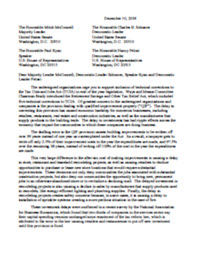The federal government will partially shutdown unless Washington policymakers can pass a year-end funding bill by Dec. 21. Negotiations over a spending measure have deadlocked over President Trump's request of at least $5 billion for construction of a wall on the Mexican border versus Democrats' offer of approximately $1.3 billion for border security. (The Hill, Dec. 13)
 |
A meeting between President Trump and Democratic leaders this week resulted in sharp disagreements over funding for a border wall. (Wall Street Journal, Dec. 11) |
- A meeting on Tuesday between President Trump and Democratic leaders resulted in sharp disagreements over the wall that played out before the media. "I am proud to shut down the government for border security," Mr. Trump told Senate Minority Leader Chuck Schumer (D-NY) and House Minority Leader Nancy Pelosi (D-CA) in the Oval Office. "I will take the mantle. I will be the one to shut it down," Trump said. (Wall Street Journal, Dec. 11)
- Both the House and Senate left Washington today with no votes on a funding bill. The Senate returns Monday and the House on Dec. 19, leaving little time to reach a deal. A possible partial government shutdown of seven agencies, including the Department of Homeland Security (DHS), would furlough hundreds of thousands of workers and cost taxpayers millions. (Politico, Dec. 13)
- A shutdown would temporarily halt DHS operations of the National Flood Insurance and EB-5 investment programs.
- If approximately 25% of the government shuts down, a decision on funding could be pushed until Jan. 3, when Democrats assume the majority in the House. Minority Leader Nancy Pelosi (D-CA) is likely to be elected House Speaker, push for a stopgap Continuing Resolution and re-open the government. The Senate would likely pass such a measure.
Prospects for Revised Tax Bill in Doubt; Roundtable, Stakeholders Push for Technical Correction to Depreciation Rules
- A must-pass spending package could be the last opportunity in 2018 for lawmakers to pass other legislation, such as a revised package of tax provisions introduced Monday by House Ways and Means Chairman Kevin Brady (R-TX). The new measure does not include extensions of temporary tax breaks, which were part of the initial legislation. (Wall Street Journal, Dec. 11 and Roundtable Weekly, Nov. 30 / Reference: 253-page text of the revised tax bill)
 |
The Roundtable on Dec. 10, 2018 joined more than 260 stakeholders in a letter to congressional leadership urging a correction of the qualified improvement property (QIP) provision. |
- Specific provisions affecting real estate in the revised legislation include technical corrections to fix errors in last year's Tax Cuts and Jobs Act. The bill would:
- shorten the cost recovery period for qualified improvement property (QIP)—a new category of depreciable property that covers upgrades and improvements to the interior of nonresidential buildings, and
- clarify that the new 20 percent deduction for pass-through business income extends to REIT dividends received by mutual fund shareholders
- The Roundtable on Monday joined more than 260 stakeholders in a letter to congressional leadership urging a correction of the QIP provision. A drafting error in the 2017 tax overhaul requires taxpayers to depreciate building improvements over 39 years, instead of one year as contemplated under the Act. This large difference in the after-tax cost of making improvements is causing a delay in store, restaurant and leasehold remodeling projects, as well as causing retailers to decline opportunities to purchase or lease new store locations that would require substantial improvements. (Comment Letter, Dec. 10 and Marketplace, Dec. 12)
- Key Senators, such as Finance Committee Ranking Member Ron Wyden (D-OR), suggested the revised House bill was unlikely to be included in a final spending agreement, "To me it is really sort of the equivalent of putting up the white flag of surrender on the idea that you're going to have a bipartisan tax policy." (Washington Examiner, Dec. 10)
If Congress does not pass tax legislation by year-end, the incoming Chairman of the House Ways and Means Committee stated that tax extenders will be a priority in the next Congress. Ranking minority member Richard Neal (D-MA) referred to retroactive renewal of more than 20 extenders when he told Tax Notes on Dec. 12, "We'll have to wait and see [how many are considered], but we certainly intend to move on them fast."

